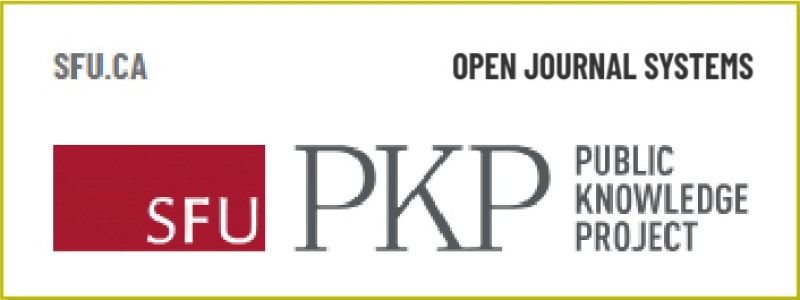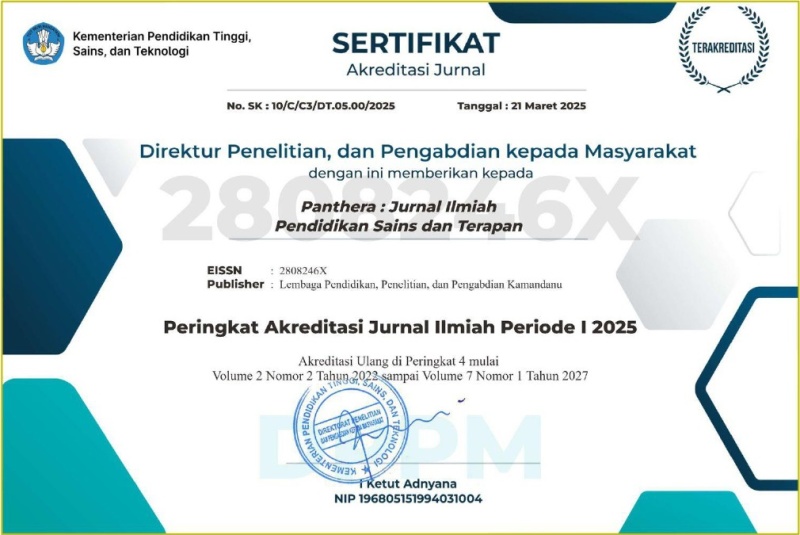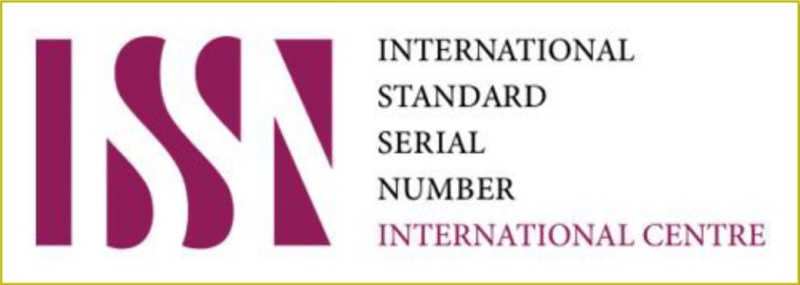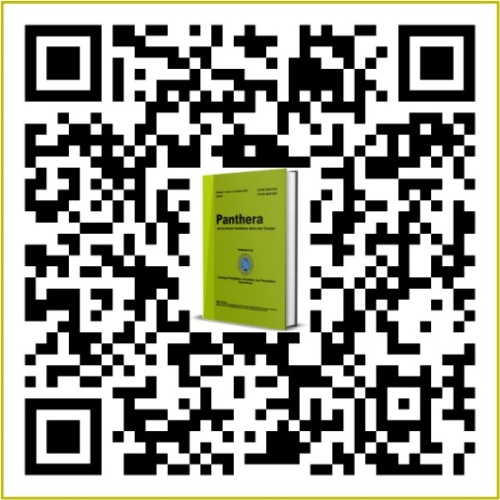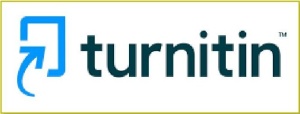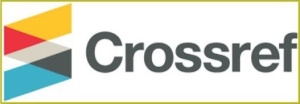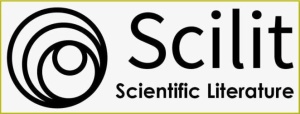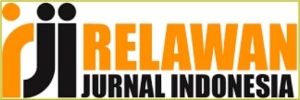Implementasi Environmental Education Day: Water, Climate, and Sustainability di SDN Sardonoharjo 1 melalui Hands-On dan Game-Based Learning untuk Membangun Literasi Iklim Berkelanjutan
DOI:
https://doi.org/10.36312/panthera.v5i4.757Keywords:
Game-Based Learning, Climate Literacy, Interactive Learning, Environmental Education, Elementary SchoolAbstract
The Environmental Education Day: Water, Climate, and Sustainability activity at SDN Sardonoharjo 1 was implemented to foster sustainable climate literacy among elementary school students through an interactive and contextual learning approach. This activity employed a descriptive qualitative method with a single case study design, involving fourth, fifth, and sixth-grade students in a series of hands-on and game-based learning activities tailored to their developmental levels. The results show that this learning model significantly improved students’ understanding of water and climate concepts through concrete and enjoyable learning experiences. Students demonstrated enhanced ability to relate the hydrological cycle and climate change concepts to real-world phenomena and logically identify the causes and impacts of climate change. Furthermore, the activity strengthened 21st-century skills such as critical thinking, communication, collaboration, and creativity, as evidenced by active participation, problem-solving ability, and the quality of student-produced posters. Other findings indicate an increase in ecological awareness and environmentally friendly behavior, reflected in students’ reflective attitudes during games and classroom discussions. This program proved effective in instilling sustainability values from an early age and can serve as a replicable learning model for strengthening environmental education at the elementary school level.
Downloads
References
Amin, M. S., Permanasari, A., & Setiabudi, A. (2019). The Pattern of Environmental Education Practice at Schools and its Impact to the Level of Environmental Literacy of School-Age Student. IOP Conference Series : Earth and Environmental Science, 245(1), 1-6. https://doi.org/10.1088/1755-1315/245/1/012029
Hosaini, H., Fitri, A. Z., & Badruzaman, A. (2024). Integrative Learning Design Innovation in Islamic Religious Education Subjects in Improving Graduate Competency through an Independent Curriculum. Research Square, 1(1) 1-17. https://doi.org/10.21203/rs.3.rs-5205013/v1
Intishar, S., Azzahro, F. Z., Aris, I. H., Syukrotus, S., Isnawati, Z., & Hidayatullah, A. F. (2020). Implementation of Environmental Care Education from Early Age. Science Education Journal, 4(1), 1-7. https://doi.org/10.21070/sej.v4i1.668
Larose, C., Blaisot, C., & Burke, E. (2022). A Participatory Student Workshop on Climate Change and Sustainability: A Comparative Case Study. Sustainable Earth Reviews, 5(3) 1-16. https://doi.org/10.1186/s42055-022-00048-x
Mang, H. M. A., Chu, H., Martin, S. N., & Kim, C. (2021). An SSI-Based STEAM Approach to Developing Science Programs. Asia-Pacific Science Education, 7(2), 549-585. https://doi.org/10.1163/23641177-bja10036
Maulida, A., Hanif, H., Kamal, M., & Oktari, R. S. (2023). Roblox-Based Tsunami Survival Game: A Tool to Stimulate Early Childhood Disaster Preparedness Skills. E3S Web of Conferences, 447(1), 1-7. https://doi.org/10.1051/e3sconf/202344702003
Munir, M., Dewanto, S. A., & Wulandari, B. (2018). The Implementation of Occupational Safety and Health (OSH) in Practical Courses of the Electronics Engineering Education Study Program, Faculty of Engineering, Yogyakarta State University. Journal of Physics Conference Series, 1140(1), 1-6. https://doi.org/10.1088/1742-6596/1140/1/012015
Putri, N. K. I. P., Murda, N., & Sudana, D. N. (2019). Pengaruh Model Pembelajaran Group Investigation Berbantuan Media Questions Card terhadap Pemahaman Konsep dan Keterampilan Berpikir Kritis IPA. Thinking Skills and Creativity Journal, 1(2), 46-57. https://doi.org/10.23887/tscj.v1i2.2049
Sarbaini, S., Hernawan, A. H., Darmawan, D., & Ali, M. (2022). Environmental Education Based on Local Values: Its Integration in the Indonesian Elementary School Curriculum. International Journal of Education and Practice, 10(4), 322-336. https://doi.org/10.18488/61.v10i4.3174
Setiawan, A., Mentari, D. M., Hakam, D. F., & Saraswani, R. (2025). From Climate Risks to Resilient Energy Systems: Addressing the Implications of Climate Change on Indonesia’s Energy Policy. Energies, 18(9), 2389-2397. https://doi.org/10.3390/en18092389
Shieh, M., & Hsieh, H. Y. (2023). Effects of Environmental Innovation Design and Organizational Culture on Product Competitive Advantage. E3S Web of Conferences, 452(1), 1-12. https://doi.org/10.1051/e3sconf/202345205008
Stevens, M., Israel, A., Nusselder, A., Mattijsen, J. C., Chen, F., Erasmus, V., Beeck, E. V., & Otto, S. J. (2024). Drawing a Line from CO2 Emissions to Health Evaluation of Medical Students’ Knowledge and Attitudes Towards Climate Change and Health Following a Novel Serious Game: A Mixed-Methods Study. BMC Medical Education, 24(1) 1-14. https://doi.org/10.1186/s12909-024-05619-4
Suhirman, S., & Yusuf, Y. (2019). The Effect of Problem-based Learning and Naturalist Intelligence on Students’ Understanding of Environmental Conservation. Jurnal Pendidikan Biologi Indonesia, 5(3), 387-558. https://doi.org/10.22219/jpbi.v5i3.9817
Sulaiman, M. K. A. (2024). Empowering the Next Generation: Using Minecraft Education to Teach Solar Photovoltaic Concepts in Secondary School. International Journal of Information and Education Technology, 14(7), 976-987. https://doi.org/10.18178/ijiet.2024.14.7.2125
Tang, K. (2024). Climate Change Education in Indonesia’s Formal Education: A Policy Analysis. NPJ Climate Action, 3(1) 57-68. https://doi.org/10.1038/s44168-024-00143-z
Downloads
Published
How to Cite
Issue
Section
License
Copyright (c) 2025 Diah Ayu Prawitasari, Wahda Annisa Nuurussyahba, & Ikrom Mustofa

This work is licensed under a Creative Commons Attribution-ShareAlike 4.0 International License.
-
Attribution — You must give appropriate credit, provide a link to the license, and indicate if changes were made. You may do so in any reasonable manner, but not in any way that suggests the licensor endorses you or your use.
-
ShareAlike — If you remix, transform, or build upon the material, you must distribute your contributions under the same license as the original.


